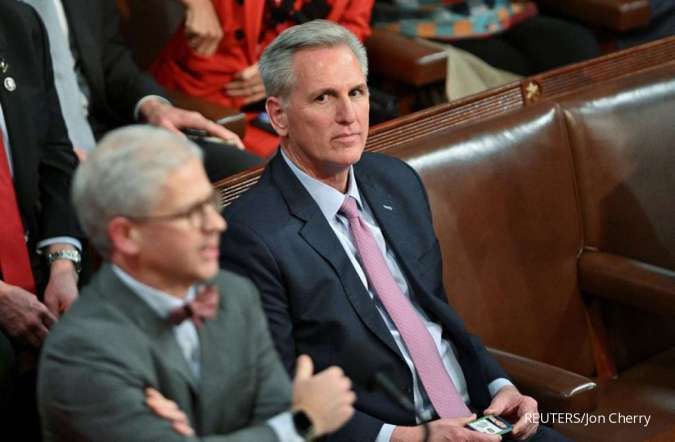STATE BUDGET - WASHINGTON. The U.S. House of Representatives on Friday passed a $1.2 trillion government funding bill with more support from Democrats than the majority Republicans, leading to a fresh threat by a hardline conservative lawmaker to oust Speaker Mike Johnson.
The House's 286-134 vote sends the measure to the Democratic-majority Senate, which has hours to act ahead of a midnight deadline (0400 GMT Saturday) when parts of the Department of Homeland Security, Internal Revenue Service and Justice Department to Treasury and State departments would begin to close.
The move marks a critical step toward ending a more-than-six-month battle over the scope of Washington's spending for the fiscal year that began Oct. 1. Ratings agencies have warned that the repeated brinkmanship could hurt the creditworthiness of a federal government that currently has more than $34.6 trillion in debt.
The measure passed the House with 185 Democrats and 101 Republican votes, which led hardline conservative Representative Marjorie Taylor Greene to introduce a measure to oust Republican House Speaker Mike Johnson.
Johnson himself ascended to that role in October after hardliners furious that his predecessor, Kevin McCarthy, had passed a temporary funding measure over their objections, ousted him as leader.
But Greene said she would not push for an immediate vote.
"I filed a motion to vacate today. But it's more of a warning than a pink slip," the North Carolina Republican told reporters.
Read Also: Record Price Rally Saps Gold Appetite in India
SENATE UP NEXT
Meanwhile, Democratic Senate Majority Leader Chuck Schumer urged his colleagues to move quickly to pass the measure.
"Let’s finish the job today. Let’s avoid even a weekend shutdown. Let’s finish the job of funding the government for the remainder of the fiscal year," Schumer said. "There is no reason to delay."
The last partial federal government shutdown occurred during Donald Trump's presidency, from Dec. 22, 2018 until Jan. 25, 2019. The record-long interruption in government services came as the Republican insisted on money to build a wall along the U.S. border with Mexico and was unable to broker a deal with Democrats.
The current 1,012-page bill provides $886 billion in funding for the Defense Department, including a raise for U.S. troops. It also covers agencies ranging from the Department of Homeland Security, the Internal Revenue Service and the Justice Department, along with the Treasury and State departments.
A separate controversial money matter is boiling in Congress where its leaders, except for Johnson, urgently are calling for final passage of a $95 billion security assistance package approved by the Senate for Ukraine, Israel and Taiwan.
Some Republicans are balking at continuing to back Ukraine in its war against the invading Russian military.
Read Also: Russian Central Bank Keeps Rates at 16%, Says Policy Will Stay Tight
While conservatives succeeded in getting Congress and Democratic President Joe Biden to agree to some fiscal 2024 spending cuts, they hoped for far deeper ones. Their disgruntlement led to the historic October removal of House Speaker Kevin McCarthy. The Republicans' subsequent political infighting shut down the House for three weeks as Republicans fought over a replacement.
Since then, with the November elections looming, most Republicans have been loath to trigger a government shutdown over spending, although Washington was brought to the brink four times since late September.
A shutdown beginning on Saturday would mean most U.S. Border Patrol and immigration agents would continue to work. But local governments might not receive new aid to shelter migrants.
U.S. soldiers and all federal workers would not get paid until new funding is enacted and national parks would be shuttered. Same situation for the two U.S. astronauts aboard the International Space Station 254 miles (409 km) above Earth.
Meanwhile, the Internal Revenue Service would continue processing tax returns that are due on April 15. It would advise taxpayers of any potential delays in refunds. At the State Department, security at embassies and other foreign offices would remain in force and passports and visas would be issued as long as there were sufficient fees to support such activities. Many other operations would cease.
/2017/06/15/550560336.jpg)














